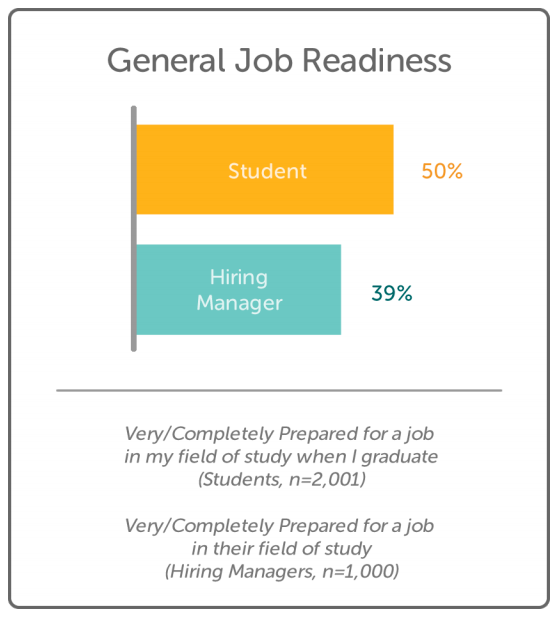Despite four years of quizzes, exams and rigorous coursework, college graduates often feel unprepared for what awaits them in the “real world.”

Source: Inside Higher Ed
“My education was great. But it was so theoretical, unlike the jobs I’m applying for. Sometimes it feels like I’m playing dress up in the real world,” says Annie Moncure, a recent graduate of James Madison University’s economics program. “When the clock strikes midnight, my professional attire is going to transform into Nike shorts and a t-shirt and I’ll just be a college student again.”
Students like Annie aren’t alone in feeling unprepared for the post-grad workplace. According to a recent Chegg report, only 50 percent of college graduates reported feeling prepared for a job in their chosen field upon graduating.
Employers have even less confidence in new grads. Just 39 percent of employers thought new college graduates were prepared.
Perhaps this is why nearly 86 percent of 2015 graduates are jobless.
Since finding steady employment is arguably the only reason behind attending college, our expensive higher education system seems largely inefficient.
And slapping a Band-Aid of federal dollars over the gash that is higher education has proven even more inefficient. So how can higher education fulfill its promise of post-grad employment for students who have taken on massive debt just for a flimsy diploma?
Career Disservices
The issue starts with ineffective career services programs. Graduating students, typically of the liberal arts persuasion, often flood overcrowded career offices in a fleeting search for last-minute guidance.
“It ends up just being treated as an office that’s one of dozens that performs a specific service,” explains Andy Chan, vice president for career development at Wake Forest University in an interview with Inside Higher Ed. “In the students’ minds, it’s one of the most important questions they have when they come to the school.”
Many students lack the insight necessary to “market” themselves, their major and their skill set for the professional world—a learned skill that undoubtedly falls under the “career services” umbrella. In an increasingly competitive job market, this extra effort is absolutely essential. Instead of framing the skills and experiences they do have, students are often left with a lackluster resume and a hard-earned degree they now see as worthless.
A Hard Lesson in Soft Skills
Like Annie, many students feel that their education was highly theoretical, which makes what they’ve learned difficult to apply in professional situations.
Employers have noticed. According to the annual Talent Shortage Survey from ManpowerGroup, 20 percent of employers worldwide can’t fill positions because they can’t find the right person. More often than not, candidates are lacking the “soft skills” necessary for professional success, such as motivation, interpersonal skills, creativity, punctuality and flexibility.
Other deal-breaking job requirements fall on deaf ears. Although more than 80 percent of employers require the completion of a formal internship for entry-level jobs, only eight percent of students make interning a priority. This is due to incompetent degree programs, and in effect, poor prioritization on the student’s end.
Back to Basics
There’s another skill a majority of graduating students lack: a basic grasp of personal finance and economic knowledge. This isn’t all the higher education system’s fault. For many students, this deficiency dates back to high school.
According to the 2014 Survey of the States, only 22 states require students to take an economics course as a high school graduation requirement—a number that has remained stagnant since 2011. Personal finance has fared even worse, with only 17 schools requiring a personal finance curriculum and only six requiring testing of working knowledge.
Basic money management skills, such as budgeting, paying off credit cards and managing student loans, prove very difficult once these fledgling “adults” leave the nest for college.
Our Take
We suggest developing the necessary “soft skills” yourself. Take professionalism, internships, the economy and personal finance into your own hands.
Even if you choose to ignore the facts, the scary truth remains: you’re at a personal disadvantage by not knowing the basics. Not only does willful ignorance limit your discretion over your future well-being, but it also inhibits your ability to understand the world around you. It’s much easier to be taken advantage of by “the system” if you’re unaware that one exists.
Do you feel unprepared for the “real world”? What stepping-stones did you take towards financial literacy? Share your experience below or chat on Facebook.










































